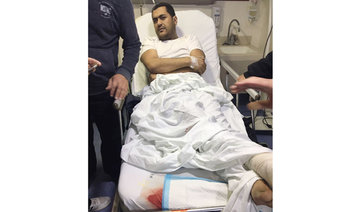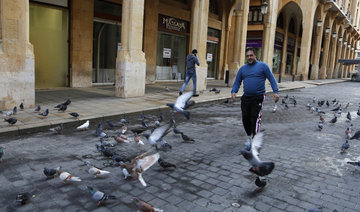BEIRUT: Lebanon thwarted militant plans to attack places of worship and government buildings over the holidays after gaining rare access to a Daesh operative, the interior minister said Friday.
Nohad Machnouk said at a press conference that an elite unit in Lebanon’s Internal Security Forces (ISF) had arrested an Iraqi Daesh commander in Beirut last June.
The commander, known as Abu Jaafar Al-Iraqi, had been tasked by the Daesh leadership to establish an Daesh network in Lebanon, according to information presented at the briefing.
This network would not only carry out attacks in Lebanon, but could have potentially hosted top Daesh officials fleeing Iraq and Syria.
Full details of the operation and the current whereabouts of Abu Jaafar were not revealed.
But Mashnuq said that for five months after the Iraqi commander’s arrest the ISF kept tabs on him through a mysterious “volunteer,” who had gained his trust and rented a home for him that was bugged by Lebanese authorities.
“This is one of those rare operations where you have someone this important in the terrorist organization, and you’re able to use him for five months to find out about the plans supposed to happen during the holidays, against places of worship and government buildings,” Mashnuq told reporters.
“The nature of this operation, as we explained, is unprecedented in the Arab world,” he claimed.
Daesh’s now-defunct “caliphate” spread across swathes of Iraq and Syria but never officially included territory inside Lebanon.
Militants from Daesh were entrenched along the Lebanese-Syrian border for several years however and claimed several deadly attacks in Lebanon.
According to a film shown at Friday’s briefing, Lebanese authorities had worked since the end of 2016 to lure Abu Jaafar to Lebanon with the help of Arab and international authorities.
An intermediary, trained in Turkey and cooperating with the ISF, rented out an apartment for Abu Jaafar that was being surveilled and met with him there several times.
Audio and video clips from the apartment were aired during the press conference.
Abu Jaafar allegedly asked Daesh leaders in Iraq and Syria for help in planning attacks on New Year’s Eve in Lebanon, and they said they may be able to provide suicide belts and automatic weapons.
He was ultimately unable to pull together an operation, the clip said.
The film mentioned one Lebanese Daesh member who had been arrested as part of the year-long operation. The minister did not mention any other arrests nor did he elaborate on the intelligence gained.
Lebanon says foiled Daesh holiday attacks using informant
Lebanon says foiled Daesh holiday attacks using informant

Thai and Cambodian top diplomats meet in China to solidify ceasefire

- The ceasefire agreement comes with a 72-hour observation period, at the end of which Thailand agreed to repatriate 18 Cambodian soldiers it has held as prisoners since earlier fighting in July
BEIJING: Top diplomats from Thailand and Cambodia kicked off two days of talks in China on Sunday as Beijing seeks to strengthen its role in mediating the two countries’ border dispute, a day after they signed a new ceasefire.
The ceasefire agreement signed on Saturday calls for a halt to weeks of fighting along their contested border that has killed more than 100 people and displaced over half a million in both countries.
Thai Foreign Minister Sihasak Phuangketkeow and Cambodian Foreign Minister Prak Sokhonn were set to meet in China’s southwestern Yunnan province for talks mediated by their Chinese counterpart, Wang Yi.
The talks aim to ensure a sustained ceasefire and promote lasting peace between the countries, according to a statement by Sihasak’s office.
Wang was scheduled to join both bilateral meetings with each of the diplomats and a trilateral talk on Monday.
China has welcomed the ceasefire announcement, which freezes the front lines and allows for displaced civilians to return to their homes near the border.
“China stands ready to continue to provide (the) platform and create conditions for Cambodia and Thailand to have fuller and more detailed communication,” a Chinese Foreign Ministry statement read.
The ceasefire agreement comes with a 72-hour observation period, at the end of which Thailand agreed to repatriate 18 Cambodian soldiers it has held as prisoners since earlier fighting in July. Their release has been a major demand of the Cambodian side.
China has sought to position itself as a mediator in the crisis, along with the United States and Malaysia.
A July ceasefire was brokered by Malaysia and pushed through by pressure from US President Donald Trump, who threatened to withhold trade privileges unless Thailand and Cambodia agreed.
Despite those deals, Thailand and Cambodia carried on a bitter propaganda war, and minor cross-border violence continued, erupting into heavy fighting in early December.
Prak Sokhonn, in a statement after his meeting with Wang, expressed deep appreciation for China’s “vital role” in supporting the ceasefire.
China also announced 20 million yuan ($2.8 million) of emergency humanitarian aid for Cambodia to assist the displaced.
The first batch of Chinese aid, including food, tents and blankets, arrived in Cambodia on Sunday, Wang Wenbin, Chinese ambassador to Cambodia, wrote on Facebook.
Sihasak said Sunday he hoped the meetings would convey to China that it should both support a sustainable ceasefire and send a signal to Cambodia against reviving the conflict or attempting to create further ones.
“Thailand does not see China merely as a mediator in our conflict with Cambodia but wants China to play a constructive role in ensuring a sustainable ceasefire by sending such signals to Cambodia as well,” he said.














